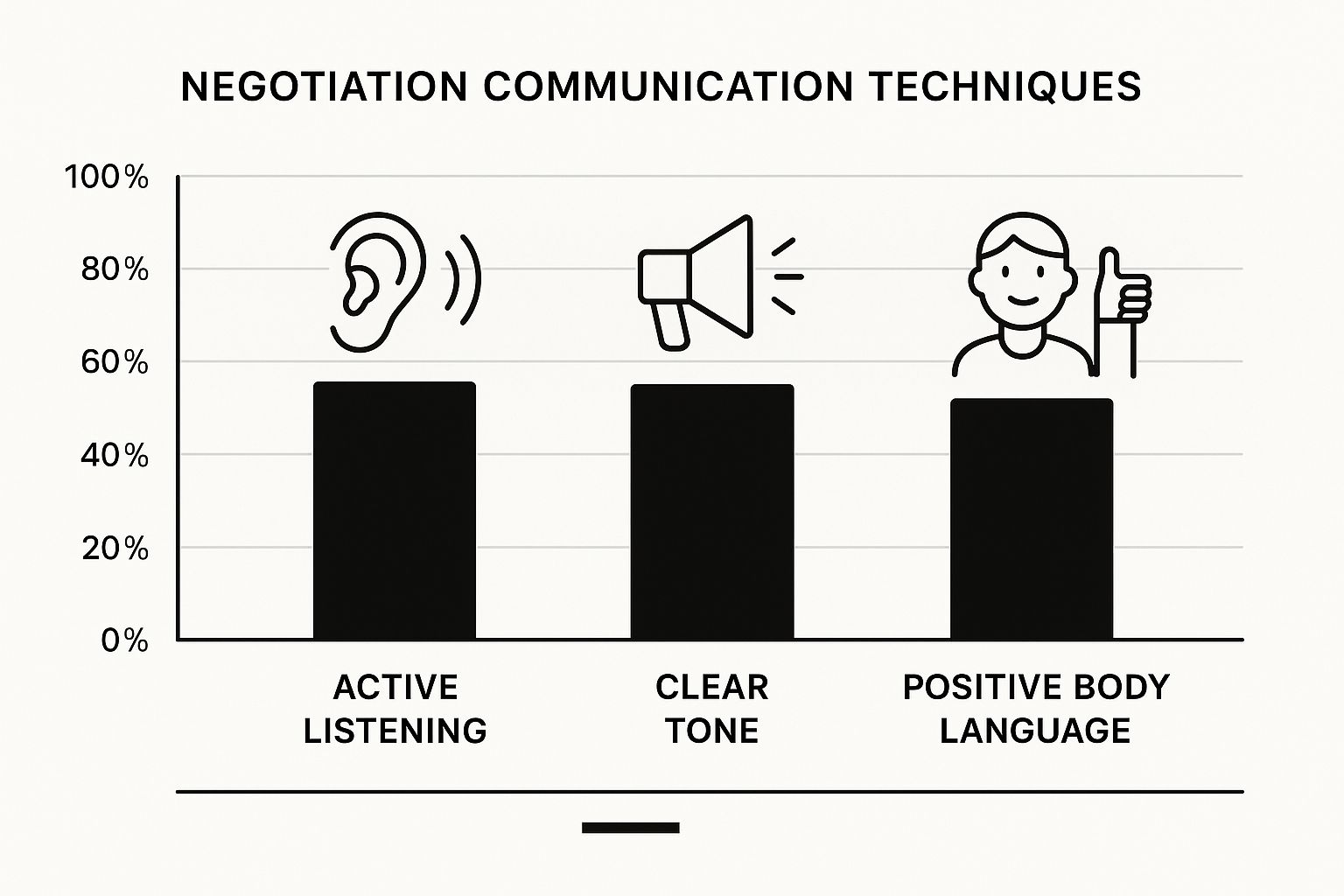
How to Negotiate Salary and Get Paid What You're Worth
Negotiating your salary is all about weaving together solid research, smart timing, and clear, professional communication. The secret is to stop thinking of it as a confrontation. Instead, frame it as a collaborative chat about the value you bring to the table. This turns your request into a business case that hiring managers can understand and respect.
Starting the Salary Conversation with Confidence
Let’s be honest: talking about money can be uncomfortable. But negotiating your pay is a totally normal—and expected—part of the hiring dance. So many candidates shy away, worried they’ll seem greedy or, even worse, that the company will pull the offer.
The reality? Handling this conversation well can actually make you look better to an employer. It shows you’re confident and know your worth right from the start. Most companies have a little wiggle room built into their initial offers, so if you don’t ask, you’re almost certainly leaving money behind.
This is a common practice, and the numbers back it up. Recent salary negotiation statistics show that a whopping 67% of procurement professionals successfully negotiated a higher salary. It’s not just for senior roles, either; 53% of employers report negotiating entry-level salaries, debunking the old myth that your first offer is your final offer. You can read more about these salary negotiation findings to see just how standard this has become.
Shifting Your Mindset
Often, the biggest obstacle is the one in your own head. Don’t see this as a battle. Think of it as your very first project with your new employer: working together to land on a number that makes sense for both of you. A great outcome is a win-win. You feel valued and motivated, and they get an employee who’s ready to hit the ground running.
A salary negotiation isn’t about just asking for more money. It’s about clearly explaining why your skills, your experience, and the contributions you’re going to make are worth a specific number. It’s a conversation about mutual investment.
This change in perspective is incredibly empowering. It allows you to advocate for yourself without feeling aggressive. The goal is simply to find a fair agreement that kicks off your new role on a high note.
As you get ready, keep these three things in mind:
- This is business, not personal. Ground your request in market data and your unique qualifications, not what you “need.”
- Confidence is contagious. A calm, well-researched approach signals that you’re a serious professional who has done their homework.
- They’re ready for it. Most hiring managers expect you to come back with a counteroffer and already have a salary range in mind.
To give you a clear roadmap, I’ve broken down the core pillars of a successful salary negotiation. Think of this as your game plan.
Quick-Start Salary Negotiation Framework
This table summarizes the essential steps to prepare for your conversation. Each pillar builds on the last, creating a strong foundation for your discussion.
| Pillar | Action | Why It Matters |
|---|---|---|
| Do Your Homework | Research industry salary benchmarks using reliable sources like Glassdoor. | Data removes emotion and grounds your request in objective market reality. |
| Know Your Value | List your unique skills, accomplishments, and the specific value you bring. | This is the “why” behind your number—it justifies the investment in you. |
| Define Your Range | Determine your ideal salary, your acceptable salary, and your walk-away number. | Having clear boundaries gives you confidence and flexibility during the talk. |
| Practice Your Pitch | Role-play the conversation to get comfortable with your key talking points. | Practice builds muscle memory, helping you stay calm and articulate under pressure. |
Following this framework will ensure you walk into the negotiation feeling prepared, confident, and ready to articulate your worth effectively. It’s about turning a potentially stressful moment into a professional triumph.
Build Your Case with Cold, Hard Data

Walking into a salary negotiation without solid data is a recipe for disaster. It’s like showing up to a final exam without ever opening the textbook. You’re essentially guessing, and that’s a quick way to leave serious money on the table.
Good research is what turns your “ask” from a hopeful wish into a compelling business case. It gives you the confidence and credibility that hiring managers can’t ignore. This is your foundation.
Don’t make the rookie mistake of looking up one number on a single salary site and calling it a day. The real magic happens when you cross-reference multiple sources to paint a complete and realistic picture of your market value.
I usually recommend a layered approach. Start broad with sites like Glassdoor or Payscale to get a general baseline for your role and city. Then, get more specific. If you’re in tech, a platform like Levels.fyi is invaluable for its detailed, user-submitted compensation packages. This triangulation method helps you filter out the noise and land on a much more accurate range.
Look Beyond the Base Salary
So many people get fixated on the base salary number, but that’s only one piece of the puzzle. What you really need to understand is your Total Compensation Value. This includes every single perk and bonus, and it gives you far more flexibility when you sit down to talk.
Here’s what you should be digging into:
- Base Salary: The straightforward, annual figure. This is your starting point.
- Performance Bonus: What’s the typical bonus structure? Is it a percentage of your salary? Ask about the average payout over the last few years to get a realistic idea.
- Equity/Stock Options: This can get complicated, but do your best to understand the grant value, the vesting schedule, and the company’s valuation (especially if it’s a startup).
- Signing Bonus: These are often used to make up for a bonus you’re leaving behind at your current job or just to sweeten the deal.
- Benefits Value: Never underestimate this! The monetary value of health insurance premiums, 401(k) matching, and professional development stipends adds up fast.
When you frame the conversation around total compensation, you show that you understand how modern companies reward their top talent. It also gives the employer more creative ways to meet your expectations if their hands are tied on base pay.
Connect the Data to Your Story
Once you’ve got your market data, it’s time to make it personal. The numbers give you the range, but your unique skills and accomplishments are what justify you landing at the top end of that range.
Think critically about how your experience directly solves the company’s problems. Did you just finish a certification that’s listed in the job description? Do you have deep experience with a specific software they’re about to implement? These are the details that make you a premium candidate, not a generic one.
Make sure your story is consistent. Your LinkedIn profile should be a mirror of these strengths, as it’s one of the first places a recruiter will go to validate what you’re saying. If you feel like your profile is falling short, our guide on how to optimize your LinkedIn profile can help you sharpen it up.
Finally, remember that salaries aren’t set in stone; they’re influenced by geography and the wider economy. Global salary increases are projected to average 4.5%, but this varies wildly. North America is looking at around 3.7% in the US, while a market like India is expecting 9.3% growth. Citing relevant trends like these shows the hiring manager you’ve truly done your homework. For more on this, check out the latest global salary increase projections on Vencon Research.
Mastering the Art of Timing and Strategy

Knowing your number is a huge part of the battle, but it’s not everything. Knowing when and how to present that number is what really closes the deal. Think of it as a delicate dance where timing is your most important partner.
One of the most common missteps I see people make is jumping the gun and putting their salary expectations on the table way too early.
Here’s the thing: whoever says a number first sets the anchor for the entire conversation. If you toss out your desired salary before they’ve made an offer, you’re flying blind. You could end up lowballing yourself or, worse, pricing yourself out of the running before they’ve even grasped the full value you bring. The goal is to keep that card close to your chest until a firm offer is in your hands.
How to Sidestep the Early Salary Question
Let’s be real, recruiters are trained to ask about your salary expectations early. It’s their job to make sure you’re in their ballpark. You need a polite, professional way to deflect this question without coming across as difficult.
Here’s a script I’ve seen work wonders. Feel free to make it your own:
“I’m really focused on finding the right role at this stage, and I’m confident we can land on a fair number once we both feel this is a great match. For now, I’d love to learn more about the responsibilities and the team. Would you be able to share the budgeted range for this position?”
This approach is brilliant because it accomplishes three things at once:
- It shows you’re a serious candidate who prioritizes the role over the paycheck.
- It professionally parks the salary discussion for later.
- It flips the question back to them, nudging them to reveal their range first.
Know Your Three Magic Numbers Before the Call
Before you even pick up the phone to negotiate, you need to have three numbers etched into your brain. These are your internal guideposts that will keep you grounded and confident when the pressure is on.
Your Three Critical Numbers:
- The Walk-Away Point: This is your absolute floor. It’s the minimum total compensation you can accept, below which you’ll have to politely decline. This isn’t just a gut feeling; it should be backed by your budget and solid market research.
- The Target: This is the realistic, well-researched number you’re truly aiming for. It should sit comfortably at the higher end of the market range you found, justified by your unique skills, experience, and what you bring to the table.
- The Anchor: This is the number you lead with to start the negotiation. It should be ambitious but not absurd—think 5-10% higher than your target. This gives you breathing room to negotiate down and still land on a number you’re thrilled with.
Having these figures locked in means you won’t get caught off guard. You’ll know exactly how to react when the offer comes in and can steer the conversation toward a result that truly works for you.
Kicking Off the Negotiation After an Offer
Once you have a written offer, the ball is officially in your court. Time to make your move. I always recommend starting the conversation with genuine enthusiasm for the role before you even mention the numbers.
Here’s a simple, effective way to open the discussion:
“Thank you so much for the offer! I’m incredibly excited about the opportunity to join the team and start contributing to [Company Goal]. I’ve had a chance to review everything, and I was hoping we could discuss the compensation.”
This opener is collaborative, not confrontational. It sets a positive, professional tone and transitions smoothly into the negotiation, showing them you know how to handle these important business conversations with confidence.
You’ve done the research, you know your worth, and the offer is finally here. Now comes the part that makes most people sweat: the actual negotiation. Whether it’s over the phone or a video call, the goal is to remain calm, confident, and, most importantly, collaborative.
Before you even think about numbers, lead with genuine excitement. Thank them for the offer and reiterate how thrilled you are about the role and the company. This immediately sets a positive, partnership-oriented tone. You’re not making demands; you’re working together to find a number that makes sense for everyone.
Presenting Your Counteroffer
When it’s time to talk numbers, be direct but polite. The key is to tie your request directly to the value you bring and the market data you’ve uncovered. You want to anchor the conversation around a new figure that’s ambitious but still grounded in reality.
Here’s a simple, effective way to phrase it:
“Thank you again for this offer; I’m very excited about the possibility of joining the team. Based on my research for this role in the current market and considering my experience in [mention a key skill or accomplishment], I was expecting a total compensation package closer to [Your Anchor Number]. I’m confident I can deliver significant value, and I’d like to discuss if we can get closer to that figure.”
This works because you’re not just throwing out a number. You’re providing a clear justification, subtly reminding them why you’re worth the investment.
Responding to Common Objections
Don’t be thrown off if the hiring manager has a few go-to responses. Most of the time, this is a standard part of the process. Think of it less as a “no” and more as an invitation to continue the conversation and explore alternatives.
Here’s a quick guide to handling the most common pushback you’ll hear.
Sample Responses to Common Objections
This table breaks down how to pivot when you hit a potential roadblock, turning a “no” into a new possibility.
| Objection | Your Response Strategy | Example Phrase |
|---|---|---|
| ”That’s the top of our budget for this role.” | Acknowledge their constraint and pivot to non-salary benefits. | ”I understand the budget limitations. Given that, could we explore other areas like a signing bonus or an additional week of PTO to help bridge the gap?" |
| "This is the maximum we can offer for this level.” | Use this as a chance to discuss your leveling. | ”I appreciate that insight. Based on my [X years] of experience and my track record in [specific area], would it be possible to discuss if my qualifications align more closely with a senior-level position?" |
| "We need to keep salaries consistent across the team.” | Frame your unique value proposition. | ”That makes complete sense. My background in [unique skill/certification] brings a specific expertise that I believe will add a new dimension of value to the team.” |
Successfully navigating these moments comes down to a blend of clear communication and active listening. It’s not just what you say, but how you say it.

As you can see, a positive, attentive, and clear approach builds trust and keeps the conversation moving forward productively.
Securing the Final Offer
Once you’ve reached a verbal agreement, there’s one final, crucial step. Before giving your official “yes,” always ask for the revised offer in writing. This is non-negotiable.
A simple email request ensures all the newly agreed-upon terms—base salary, bonus, stock options, PTO—are documented, leaving no room for misunderstandings. If you need inspiration, our guide on how to write an application follow up email has some great templates you can adapt.
Feeling nervous? It might help to know you’re in good company. A recent survey found that 55% of Gen Z workers negotiate their starting salaries. And across all age groups, the success rates are incredibly high—around 77-79% of people who ask for more get it. The biggest hurdle is just mustering the courage to start the conversation.
Negotiating Beyond the Base Salary

So, you’ve hit a wall on base pay. The hiring manager says, “This is the absolute top of the band for this role,” and you get the feeling they actually mean it. This isn’t a dead end. In fact, it’s an invitation to get creative and look at the bigger picture: your total compensation package.
A great offer is so much more than just a paycheck. If a company is genuinely excited to bring you on board, they often have wiggle room in other areas that can make a huge difference in your professional and personal life. Knowing how to negotiate salary is one thing, but knowing when to shift the conversation from base pay to other valuable perks is the mark of an experienced negotiator.
Expanding the Compensation Conversation
When the salary talk stalls, you can keep the ball rolling by exploring other avenues to make the offer compelling. A smooth way to make this pivot is to say something like, “I understand the constraints on the base salary. With that in mind, I’d love to explore other parts of the compensation package to see if we can bridge the gap.”
This simple sentence does two things: it shows you’re still enthusiastic about the role and signals that you’re a collaborative problem-solver. From there, you have several levers you can pull to sweeten the deal.
Here are a few of the most common—and valuable—perks worth bringing up:
- A Signing Bonus: This is a fantastic one-time payment to make up for a slightly lower base or to cover a bonus you’re walking away from at your old job. It’s often much easier for a company to get a one-off payment approved than a permanent salary hike.
- Performance Bonuses: Dig into the bonus structure. Can the target percentage be bumped up? Make sure you clarify how bonuses are calculated and what the historical payout rates have been. This gives you a much clearer picture of your actual earning potential.
- More Paid Time Off (PTO): An extra week of vacation is a huge win for your mental health and work-life balance. You might be surprised at how flexible companies can be with PTO.
- Professional Development Budget: This is a direct investment in you. Ask for a dedicated budget for courses, certifications, or conferences that will help you grow in your role. It’s a win-win, as your new skills directly benefit the company.
Unlocking Long-Term Value
Beyond the immediate financial benefits, think about negotiating for things that will pay dividends for years to come. This is where you play the long game.
Your career is a marathon, not a sprint. A better title, a flexible schedule, or a guaranteed six-month performance review can sometimes be far more valuable than a few extra thousand dollars today.
For example, getting a title bump from “Analyst” to “Senior Analyst” might not come with an instant pay raise, but it sets you up for bigger opportunities down the line, both inside and outside the company. Likewise, securing a remote or hybrid work arrangement can save you thousands a year in commuting costs and give you back hours of your day.
Never underestimate the power of these non-salary benefits. They show you’re thinking strategically about your career and can dramatically improve your overall job satisfaction.
Answering Those Tricky Salary Negotiation Questions
No matter how much you prepare, you’re bound to run into a few tricky questions during salary talks. Knowing how to handle these moments gracefully is what separates a good outcome from a great one. Let’s walk through a few common scenarios I’ve seen trip people up.
”What if the Application Asks for My Desired Salary?”
Ah, the classic pre-screening question. Companies use this to filter candidates early, but it’s a trap you want to avoid. Your goal is to delay naming a number until you’ve had a chance to demonstrate your value in an interview.
If the online form lets you, try leaving the field blank. Sometimes entering “0” or typing “Negotiable” will work, too.
But what if a number is mandatory? In that case, give a broad, well-researched salary range. Frame it like this:
“My research for this type of role in the Chicago area shows a typical range of $75,000-$95,000. I’m flexible and would love to discuss a figure that’s fair for both of us once I have a better understanding of the role’s total scope.”
This approach proves you’ve done your homework but keeps the door wide open for future discussion.
”How Do I Respond if They Say the Offer Is Final?”
Hearing the words “this is our best and final offer” can feel like hitting a brick wall. But it’s often more of a negotiation tactic than a hard stop. The trick here is to shift the conversation away from the base salary.
You can pivot gracefully while still advocating for yourself. Try saying something like:
“I really appreciate you being transparent about the salary, and I understand it’s firm. I’m incredibly excited about this opportunity. To make the total package work, could we explore other areas? For example, is a sign-on bonus or an additional week of PTO something you could consider?”
This respects their position but opens up a new path for negotiation. It shows you’re a collaborative partner, not just an applicant making demands.
”Is It Okay to Negotiate for an Internal Promotion?”
Yes! And you absolutely should. A promotion isn’t just a new title; it’s a new job with significantly more responsibility. Your pay should reflect that step up. Never assume your loyalty will automatically translate into the best possible offer.
Treat it just like you would an external job negotiation. Research the market rate for your new role. Build a case for yourself based on your proven performance at the company and the expanded value you’re about to deliver. If you’re making your first big internal jump, it can even be helpful to brush up on how to frame your accomplishments by reviewing common entry-level interview questions.
”Should I Negotiate Over Email or on the Phone?”
A live conversation is almost always better. A phone or video call allows for a natural back-and-forth, lets you read the hiring manager’s tone, and builds a much stronger human connection. Long email chains can feel impersonal and easily lead to misunderstandings.
My advice? Use email for two things: to schedule the phone call and, most importantly, to get the final, revised offer in writing before you give your official “yes.”
Ready to land the offers you deserve? Jobcamp uses AI to create customized resumes and cover letters that get you noticed. Stop spending hours on applications and start getting more interviews. Try Jobcamp for free today and accelerate your job search.

